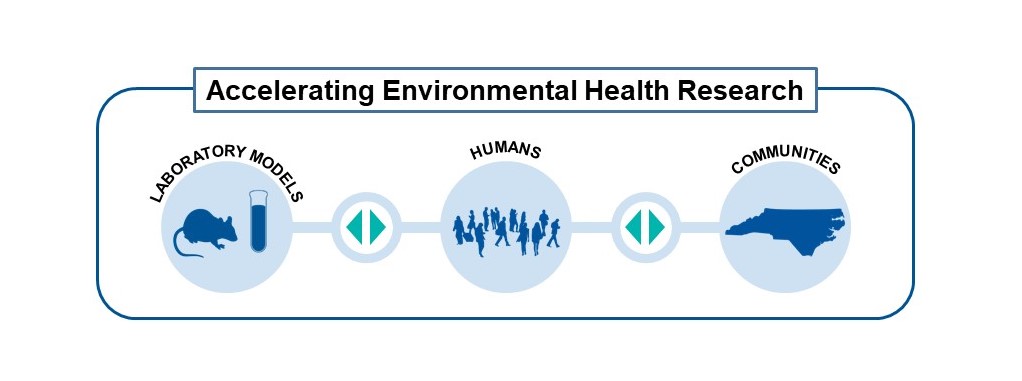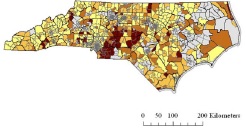CEHS Areas of Research

The theme of the CEHS is translating interdisciplinary research on environmental health susceptibility to improve public health in North Carolina CEHS defines translation as movement from models to humans (supported by our Translational Research Support Core) to communities (supported by our Community Engagement Core), dynamically, with research flowing in both directions to translate, and also to respond to communities and to identify mechanistic underpinning for human environmental susceptibilities.
The CEHS’s Translational Research Vision strategically moves research from laboratory models to humans to communities. The CEHS defines “translation” as movement from laboratory models to human studies, and from human studies to communities, while acknowledging that this is a dynamic, iterative process, and that research must flow in both directions (lab to populations and back; communities to human studies to mechanistic investigations). Each of our focus areas are unique strengths at UNC, fostering depth of collaborations among faculty across campus. CEHS leverages broad UNC scientific strengths for the benefit of our membership and our environmental health mission, supporting faculty as they seek to develop novel, interdisciplinary research.
The CEHS, anchored by its emphasis on North Carolina public health concerns, is organized around three Translational Research Focus Areas: Cardiopulmonary Disease, Healthy Development and Aging, and Environmental Cancer. Important environmental exposures in the state include air pollution, particularly secondary organic aerosols (SOAs, a known source of PM2.5); per- and poly-fluoroalkylated substances (PFAS) in drinking water; pesticides; natural disasters associated with extreme weather events; consumer product additives; and metals exposure (arsenic through ground water in the state’s “slate belt”, and cadmium and lead through coal ash and industrial exposures). These exposures are cross-cutting, appearing in each of CEHS’s three research foci.
Associate Director for Translational Science:
Rebecca Fry, PhD, Department of Environmental Sciences and Engineering
Email: rfry@email.unc.edu Phone: (919) 843-6864
Our Research Focus Areas
Cardiopulmonary Disease
 Air pollution is a dominant driver of environmental disease in the US and worldwide. A primary focus of study in the Cardiopulmonary Disease Research Focus Area is on how air pollutants such as ozone, particulate matter (PM) and smoke affect respiratory and cardiac function and activity. CEHS researchers investigate disease outcomes such as asthma, influenza and heart attacks.
Air pollution is a dominant driver of environmental disease in the US and worldwide. A primary focus of study in the Cardiopulmonary Disease Research Focus Area is on how air pollutants such as ozone, particulate matter (PM) and smoke affect respiratory and cardiac function and activity. CEHS researchers investigate disease outcomes such as asthma, influenza and heart attacks.
Our state continues to be challenged by persistent health disparities in disease incidence and survival by race/ethnicity, a pattern particularly evident for heart disease and chronic lung disease among adults, and asthma among children. To better understand these disparities, CEHS researchers are conducting a genome-wide, trans-ethnic search for genetic variants that increase susceptibility to the effects of ambient particulate matter (PM) air pollution on stroke, heart attack and sudden cardiac death. In addition, Center researchers are collaborating with the CEHS CEC to help translate cardiopulmonary research findings and provide various education and outreach activities related to asthma and healthy homes issues.
Furthermore, access to the Center for Environmental Medicine, Asthma and Lung Biology (CEMALB) laboratory facilities and the NC Translational and Clinical Sciences Institute (NC TraCS, UNC CTSA) resources enables CEHS investigators to extend basic science, mechanistic and other animal findings into human studies. This work, in turn, enables examination of gene-environment interactions and the testing of potential interventions in focused, proof-of-concept studies.
Research Co-Directors:
Ilona Jaspers, PhD; Department of Pediatrics
Email:ilona_jaspers@med.unc.edu Phone: (919) 966-8657
Chantel Martin, PhD, Department of Epidemiology
Email: martchan@email.unc.edu Phone: 919.962.8657
Healthy Development and Aging


Map showing arsenic exposure levels, with increasing intensity of color representing increased exposure. Brown areas are above EPA recommended limits.
In North Carolina, drinking water contaminated with metals is a growing public health concern as 2.3 million residents get their drinking water from private wells, which are not regulated by the state or required to be tested for contaminants. CEHS researchers recently partnered with UNC Superfund Research Program (SRP) researchers to discover that areas with elevated levels of arsenic were associated with a higher prevalence of birth defects. CEHS CEC, with input from Center researchers, is leading efforts to reduce metals-induced disease during these early windows of susceptibility by educating the public on how to reduce exposure to metals such as arsenic and lead and by training public health practitioners to assess and help prevent adverse health outcomes such as lead poisoning.
Research Co-Directors:
Folami Ideraabdullah, PhD, Department of Genetics
Email: folami@email.unc.edu Phone: (919) 445-9047
Stephanie Engel, PhD; Department of Epidemiology
Email: Stephanie.Engel@unc.edu Phone: (919) 966-7435
Environmental Cancer
 Cancer research has been an area of strength at UNC-Chapel Hill and our Center builds upon the strengths in cancer research by emphasizing novel hypotheses and facilitating new projects in environmental carcinogenesis. Environmental cancers studied at CEHS include:
Cancer research has been an area of strength at UNC-Chapel Hill and our Center builds upon the strengths in cancer research by emphasizing novel hypotheses and facilitating new projects in environmental carcinogenesis. Environmental cancers studied at CEHS include:
- bladder cancer,
- breast cancer,
- colon cancer,
- ovarian cancer, and
- skin cancer.
North Carolina mirrors our nation with a substantial mortality disparity that exists for breast cancer between Black and White women, and the CEHS has supported researchers in efforts to understand the environmental and mechanistic bases for these disparities. Skin cancer has also been a priority among CEHS researchers as North Carolina has the fourth highest rate of melanoma in the US. Working closely with Center researchers, our CEHS CEC developed educational materials, trainings and web-based tools on breast and skin cancer risks and prevention and are disseminating these findings to public health practitioners throughout the state.
Research Co-Directors:
Cyrus Vaziri, PhD; Department of Pathology and Laboratory Medicine
Email: cyrus_vaziri@med.unc.edu Phone: (919) 843-9639
Katherine Hoadley, PhD, Department of Genetics
Email: hoadley@med.unc.edu Phone: 919-962-8416
